Newsletter: March 1, 2024
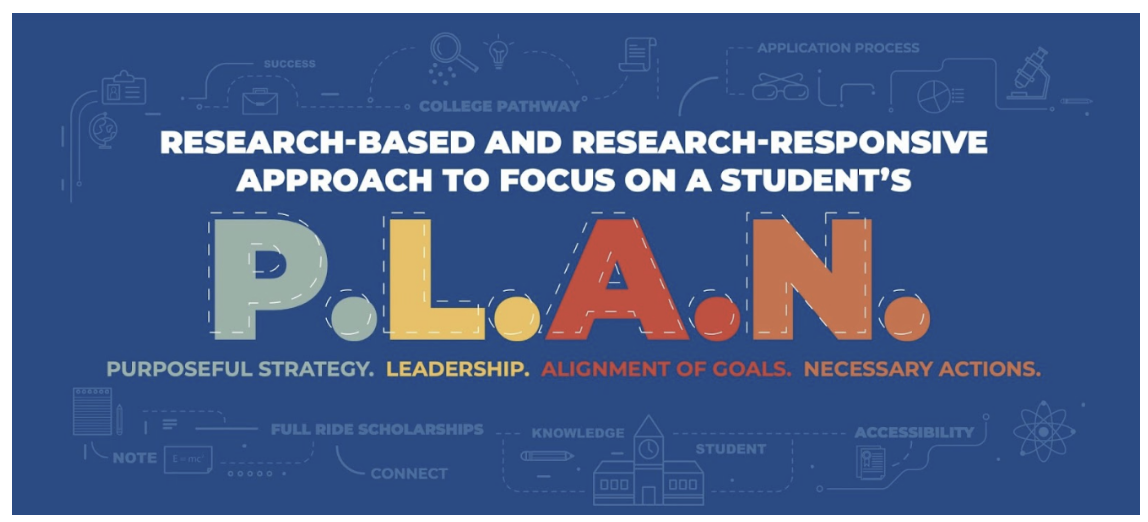
College Cohort News…
March 1, 2024
Mychal Wynn

This month we are presenting College Cohort Scholar Awards based on students’ first semester academic performance. Scholarship is the first of our program’s 3 pillars: Scholarship, Leadership, and Service. Academic scholarship is a precursor to successful PSAT, SAT, or ACT exam performance with exam performance providing a direct link to merit- and need-based scholarship opportunities.
A core question for our students is, “What has become clearer to you?” Our own response to this question drives the continuing evolution of our program. Through published materials we have been writers and publishers. Through teacher and counselor training we have been staff developers. Through parent and student presentations we have been informational and motivational speakers. Now, by providing personalized guidance for students and parents, we are serving as coaches. Not just college planning coaches, but learning coaches, which is the context in which we are now approaching ACT Learning and Study Strategies—not as prep for the ACT, but as learning through the ACT. This month’s newsletter recognizes academic achievement and provides test prep guidance.
Congratulations Cohort Scholars
Following are the recognition levels for our College Cohort Scholar Awards, based on academic GPA:
3.0 – 3.49 – Scholar
3.5 – 3.99 – Scholar with Honor
4.0+ – Scholar with Highest Honor
Join us in celebrating the following students who embody our pillar of scholarship. We believe that the intentionality with which they are pursuing learning in their middle school and high school classes will expand their postsecondary opportunities whatever their educational or career pathway.
College Cohort Scholar
Elijah, E., 9th Grade, Eagle’s Landing Christian Academy (GA)
Kalyn C., 11th Grade, Panther Creek High School (NC)
London M., 6th Grade, Safety Harbor Middle School (FL)
Zaire H., 11th Grade, Marietta High School (GA)
College Cohort Scholar with Honor
Anna N., 11th Grade, St. Petersburg High School IB Program (FL)
Cameron S., 11th Grade, Landmark Christian School (GA)
Erin N., 11th Grade, Kennesaw Mountain High School Magnet Program (GA)
Isaiah E., 9th Grade, Eagle’s Landing Christian Academy (GA)
Ja’Nae C., 11th Grade, Lake City Early College High School (SC)
Joshua J., 8th Grade, Creekland Middle School (GA)
Kennedi S., 11th Grade, Pope High School (GA)
Layla T., 9th Grade, Northside Christian School (FL)
V’mari C-K., 7th Grade, Fitzgerald Middle School (FL)
Weldon “TJ” M., 11th Grade, Druid Hills High School (GA)
Zachariah T., 10th Grade, Marietta High School IB Program (GA)
Maya H., 9th Grade, Woodward Academy (GA)
Nate H., 11th Grade, Woodward Academy (GA)
College Cohort Scholar with Highest Honor
Arshia A., 11th Grade, Palm Harbor University IB Program (FL)
Bryan N., 9th Grade, Mt. Paran Christian School (GA)
Charles P., 10th Grade, Marietta High School (GA)
Ezekiel C., II, 11th Grade, Rivers Academy (GA)
Griffin S., 10th Grade, Lakewood high School CAT Program (FL)
Jocelyne L., 11th Grade, St. Petersburg High School IB Program (FL)
Josiah W., 11th Grade, Boca Ciega High School (FL)
Kevin N., 9th Grade, Northeast High School (FL)
Latanya M., 11th Grade, J Paul Truluck Creative Arts & Science Magnet School (SC)
Nishan W., 11th Grade, Hiram High School Academy of Computer Science (GA)
Madison L., 10th Grade, J Paul Truluck Creative Arts & Science Magnet School (SC)
Vaughn T., 9th Grade, North Cobb High School Magnet Program (GA)
Why the ACT?
As we noted in our November newsletter when we introduced our ACT Project, we believe that students should commit to either the SAT or the ACT. Since colleges will accept either exam, we have chosen to commit our efforts to assisting students in increasing ACT scores—not by focusing on the test, but focusing on learning. To support learning, we believe:
- The ACT has sufficient support tools and materials
- The ACT is aligned with the high school curriculum
- By focusing on learning, students will deepen their content knowledge in each of the ACT subject-areas, thereby increasing both grades and test scores
A focused study approach to increasing content knowledge in each of the ACT subject-areas (math, science, English, and reading—as well as writing) will correlate with higher performance in a student’s corresponding high school classes.
More Than Test Prep
If the focus is wrong, then the approach to learning will be wrong as ell. This means that if a student’s focus is on prepping for the ACT but not on developing the underlining knowledge that is being tested on the ACT, then the focus is wrong. Consider why Duke University, which admits the most academically accomplished students from throughout the world, coaches students through The Study Cycle:
“The study cycle is a guide to help you distribute your studies so you aren’t doing it all at once at the last minute, and to reinforce your learning from one step to the next.”
While thousands of students admitted to Duke will have spent many thousands of dollars on test prep, Duke recognizes that even the most academically accomplished students oftentimes enter college lacking the underlying learning strategies and study skills to be successful college students.
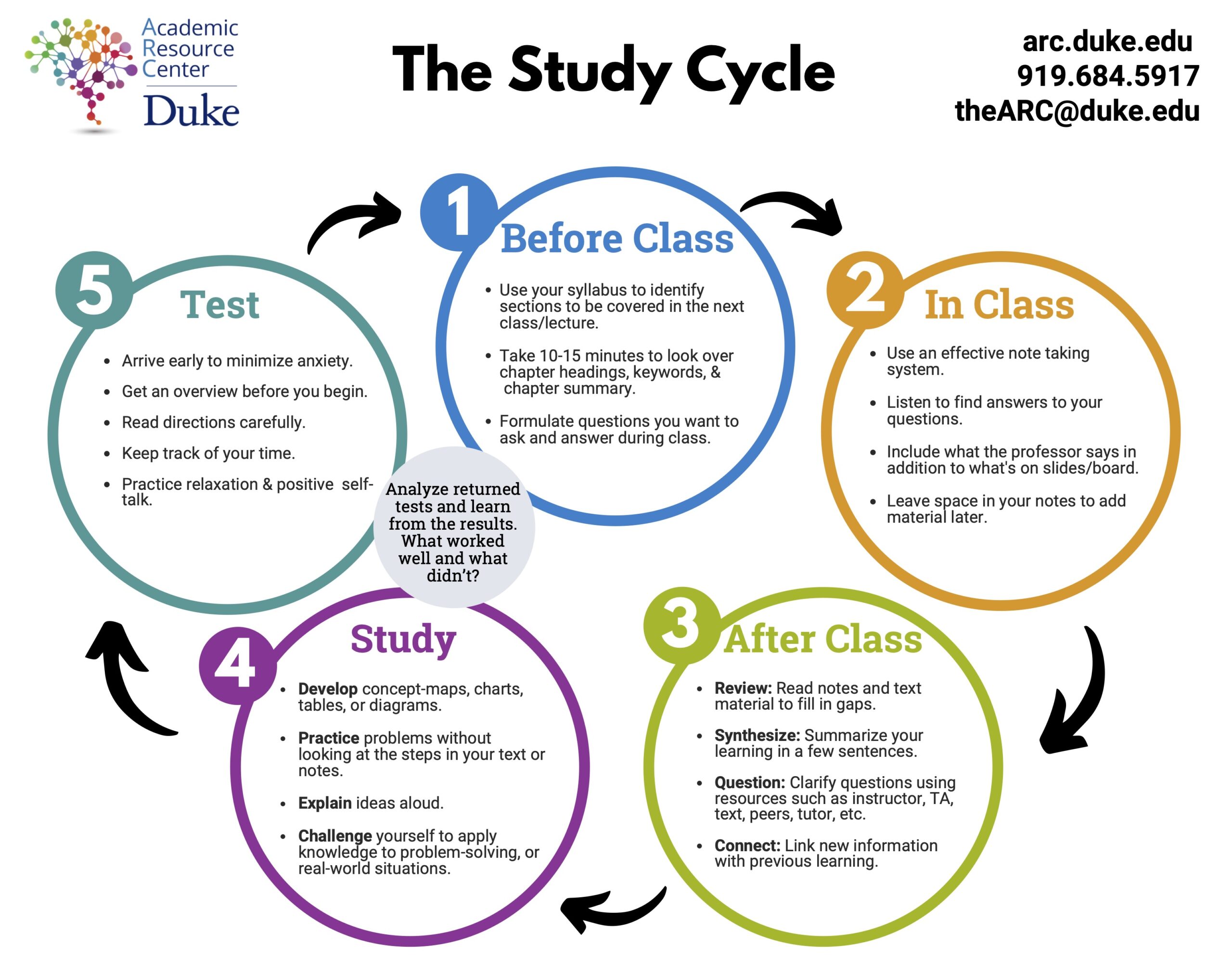
Higher Scores – Better Students
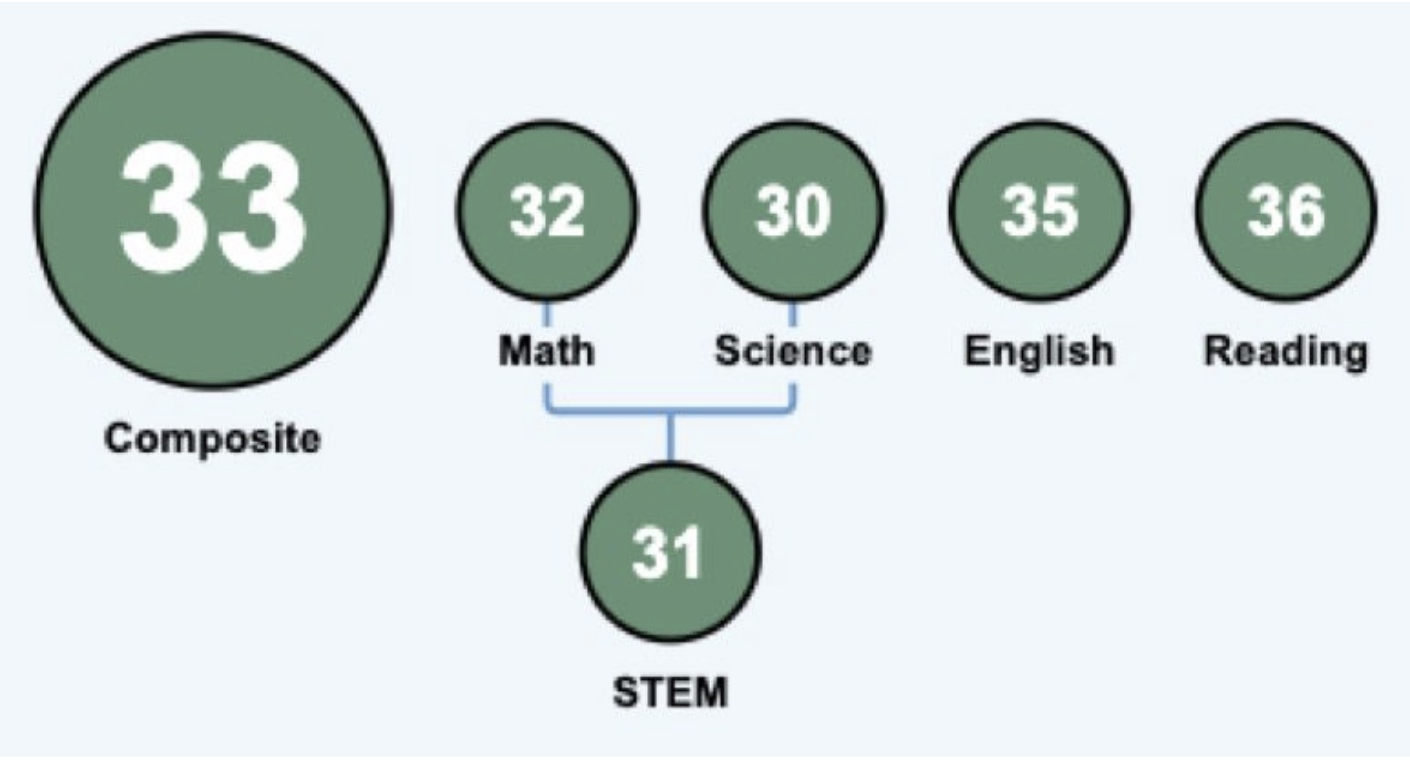
Congratulations to our ACT Project contributors who earned scholarship qualifying scores on the February ACT exam. While our students acknowledge the value of test taking strategies, they note that their scores reflect their level of content knowledge and critical thinking. Both of which are skills that they use each day in school and upon which they will rely after entering college. However, their commitment to leadership and service by helping other students to become better students and earn higher test scores will be recognized by both colleges and scholarship providers.
Our contributors have established themselves as extraordinary role models for our students in grades 6 – 11, as they bring value to our program and to their respective high schools.
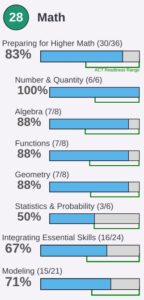 The ACT Math section is the most difficult for the majority of test takers. Only 30% of students achieved an ACT college readiness score of 22. However, as indicated in the illustration to the left, if you have taken the ACT, or plan to take the exam this month, your score report will provide insight into your learning gaps.
The ACT Math section is the most difficult for the majority of test takers. Only 30% of students achieved an ACT college readiness score of 22. However, as indicated in the illustration to the left, if you have taken the ACT, or plan to take the exam this month, your score report will provide insight into your learning gaps.
Rather than “prepping” for the next test, you would be better served by closing your “learning gaps.” Closing learning gaps is a result of pursuing learning strategies that results in your encoding, retaining, and retrieving the “how” and “why” required for solving complex mathematical problems and equations.
 The ACT Science section is the second most difficult for the majority of test takers. Only 31% of students achieved an ACT college readiness score of 23. However, the ACT Science section does not require extensive knowledge of science, but relies on critical thinking skills, reading skills, and the interpretation of data—all of which are skills that you can learn, but more importantly, are skills that you should be applying daily in your life in and outside of school.
The ACT Science section is the second most difficult for the majority of test takers. Only 31% of students achieved an ACT college readiness score of 23. However, the ACT Science section does not require extensive knowledge of science, but relies on critical thinking skills, reading skills, and the interpretation of data—all of which are skills that you can learn, but more importantly, are skills that you should be applying daily in your life in and outside of school.
The ACT Reading section is the third most difficult for the majority of test takers. Only 40% of students achieved an ACT college readiness score of 22. Reading is an essential skill with value far beyond taking the ACT. While test prep strategies will be helpful, developing foundational skills in reading is relied upon in virtually every high school classroom and in every future college classroom.
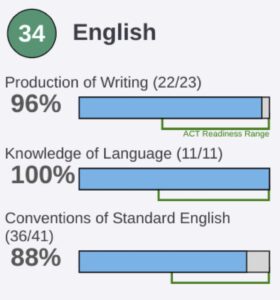 The ACT English section is where most test takers earn their highest scores. 51% of students achieved an ACT college readiness score of 18. Developing a foundational understanding of English, language usage, and writing are skills that students have been neglecting with their reliance on social media and text messaging (both of which are filled with slang, improper grammar, and nonstandard English language usage). Consequently, doing well on the ACT Reading, English, and Writing sections requires reading and writing more, and reading and writing well.
The ACT English section is where most test takers earn their highest scores. 51% of students achieved an ACT college readiness score of 18. Developing a foundational understanding of English, language usage, and writing are skills that students have been neglecting with their reliance on social media and text messaging (both of which are filled with slang, improper grammar, and nonstandard English language usage). Consequently, doing well on the ACT Reading, English, and Writing sections requires reading and writing more, and reading and writing well.
What Are We Learning?
Through our ACT Project, we are dispelling such myths as, “I am just not a good test taker.” Any student, from any school, is capable of developing deep levels of content knowledge when presented with the content accompanied by strategies for learning and retaining the content.
Our ACT contributors are not only good students, they are great leaders. Our project leader scored a “33” on her first testing. Instead of approaching her own test prep with the attitude, “I need to focus on my own test prep,” her approach has been, let’s share the learning strategies and study skills that each of us is using so that all of us can achieve deeper levels of learning and higher test scores.
What Should You Do?
If you have aspirations of getting into top colleges or qualifying for full scholarships, you must become an intentional learner:
- Identify your learning style.
- Take ownership of the Study Cycle.
- Identify your time-of-day energy levels and develop the appropriate time and location for studying.
- Identify the learning strategies and study skills that work best for your learning style, temperament, mindset, and grit.
The final step is to deepen your content knowledge in each of the ACT subject-areas and incorporate what you are expected to know into your daily study routines and classwork. This approach will make you a better learner and result in higher ACT scores.
These are not “suggestions,” these are proven strategies that will require realigning your priorities and committing more time to activities that matter in college admissions and scholarship consideration.
Why Become a Better Learner?

Learning Is Important
You must align your efforts in school with your aspirations for the future. What type of engineer would you become if you are not willing to develop a deep understanding of mathematics? What type of doctor would you become if you are not willing to develop a deep understanding of biology and human anatomy? What type of teacher would you become if you are not willing to become a thoughtful and pensively reflective learner?
ACT Scores Are Important
If your high school requires that you take the SAT or ACT, it should be viewed as an opportunity and not a burden. PSAT, SAT, or ACT exam scores can expand access to colleges, pre-college programs, internships, fly-in programs, and scholarships. We prefer the ACT because there should be alignment between your ACT scores and what you have learned in your K – 11 schooling. High test scores are the result of deep levels of content knowledge. This means that the quality of schools and teachers matter. However, so too does the quality of how you approach learning and studying. We have worked with private school students who have test scores that are no better than public school students attending low-performing schools.
Students who attend the best schools and who have the best teachers can still have low levels of learning and retention of learning if they are not vested in their own learning. In contrast, students attending the lowest-performing schools can achieve high levels of learning if they are vested in their own learning. Each year, there are thousands of students who earn top scores on AP exams without having taken the corresponding AP class. How do they do it? They read the book, teach themselves, and supplement their efforts with tutors.
What We Are Planning…
ACT Intensive Summer Sessions
We are planning 4-5 day ACT Intensive Sessions this summer, with each session focused on a specific ACT Section. Each session will address the following 5 components:
- What you expected to know on the ACT
- Learning and study strategies consistent with your learning style
- Developing a Study Cycle consistent with your grit, mindset, and temperament
- Daily pre- and post-testing
March Discussion Groups
10th and 11th Grade: We will continue our combined 10th/11th grade discussion group. Students should be prepared to discuss their summer plans and how they factor into their overall college planning strategy.
9th Grade: I (Mr. Wynn) will continue to facilitate the conversation with our 9th graders regarding building their résumé and branding. Students should be prepared to discuss their email signatures.
Emerging Middle School Leaders: All participating students should attend this meeting and be prepared to discuss the progress of their leadership/community service project. Congratulations to Peyton Wilson, the Emerging Middle School Leaders College Adviser, who has been admitted the The University of Chicago graduate school.
ACT Prep and Learning Strategies Plan: This month’s meeting will focus on each student’s contribution to the project.

Mark Your Calendar:
- March 9, 2024
- April 13, 2024
- May 11, 2024
Monthly meetings are restricted to students registered in our program and their parents.
